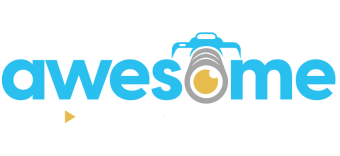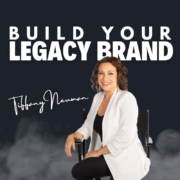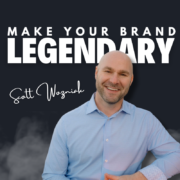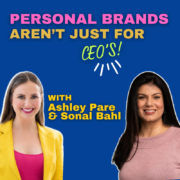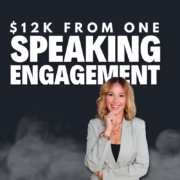167. Building a Lasting Legacy Brand with Tiffany Newman
Have you ever wondered why some entrepreneurs seem to scoop up all the attention, they pull off massively successful launches, they get featured in top media outlets, and they seem to snatch up big opportunities all the time?
Well, It’s NOT because they’re necessarily better at what they do, or have more experience
It’s because they’ve created a legacy brand.
This week’s guest, branding expert, Tiffany Neuman came on to share how you too can create your legacy brand that elevates your impact, your income & your influence.
Tiffany developed her Legacy Brand Method™ to capture your personality and create a more compelling, impactful, and inspiring presence.
So whether you’re just starting on your path to success, or you already have a 7-figure+ business Tiffany’s here to talk about what it take to create a Legacy Brand to match your BIG vision.
Resources
Connect with Tiffany Neuman
Listen to episode 157: Make Coaching Your Marketing with Caryn Gillen
Get the steps to create an Unforgettable Brand in less than 5 minutes!
Take the Standout Business Scorecard. It’s quick & FREE!
Click here >
Transcript
Tiffany Neuman:
A good branding process. It’s not logos, it’s not colors, it’s not fonts. Yes, that is how you end up showing up in the long run, but the process to capture the essence and the reason a brand works so well is really by peeling all the layers off and getting back to the core of what your identity is. So it’s really an identity shift and really finding your identity is actually what I consider a really strong branding practice, and that starts with your vision, your values and finding your voice.
Brad Powell:
Welcome to the Standout Business Show, where it’s all about making a bigger difference by doing business differently. I’m Brad Powell, and if you’re a business leader who refuses to blend in, if you’re ready to create a bingeable brand that can’t be ignored, if you want loyal customers so pumped they’re sharing all your stuff with their friends, you’re in the right place. Because today we’re talking about how to make your message, your movement and build a legacy brand. So here’s my question for you have you ever wondered why some entrepreneurs seem to scoop up all the attention? They pull off massively successful launches, they get featured in top media outlets and they seem to snatch up big opportunities all the time? Well, it’s not because they’re necessarily better at what they do or have more experience. It’s because they’ve created a legacy brand.
Brad Powell:
So today’s guest branding expert, tiffany Newman, is coming on to share how you, too, can create your legacy brand that elevates your impact, your income and your influence. Tiffany developed her legacy brand method to capture your personality and create a more compelling, impactful and inspiring presence. So, whether you’re just starting on your path to success or you already have a seven-figure business, tiffany’s here to talk about what it takes to create a legacy brand to match your big vision. And with that, let’s start the show. All right, tiffany, welcome to the show.
Tiffany Neuman:
Thanks so much for having me, Brad. I’m excited to be here with you today.
Brad Powell:
Yeah well, I’m excited to talk about this too, because we do talk quite a bit about brand and particularly personal brand on this show, but we’ve never actually approached this word legacy when it applies to brand, and so, as we open up this conversation, what exactly do you mean when you say let’s create a legacy brand?
Tiffany Neuman:
Sure. So this idea of a legacy brand stemmed from my work. I worked in the corporate world for almost 20 years with brands like Burt’s Bees, stoli, vodka, adidas, just a lot of bigger brands and so when I came into the online space, I really recognized that a lot of people were consistently changing what they were doing every five minutes, because, as entrepreneurs, we tend to get bored, and so, you know, somebody would show up in one capacity as a health coach and then switch, and of course, we’re meant to evolve, we’re meant to change. You know, it doesn’t mean that you have to be locked in, but it also means that you need to be consistent, and that was the one thing that I see most people missing in their businesses is consistency with their brand, and not just their visuals, but their messaging, how they’re showing up, you know what they’re, what content they’re putting out into the world, and so that’s really the first piece is it’s a brand that stands the test of time.
Tiffany Neuman:
So, if you see, you know thought leaders that you admire. They may shift and they may have new offers, but they’re not changing their brand every five minutes, and a lot of entrepreneurs think that they have to change their brand when they change their offers. And so I like to give the analogy of, say, target. You know target’s not going to change the color red, you’re not going to see the target logo in purple all of a sudden, or you’re not going to see, like Levi’s jeans change their entire message and come up with a whole new strategy. And so that’s really what I help people do, especially in online businesses, is really get clear on who they are, what their essence is, and brand around that rather than just their offers, because if you brand around your offers, that’s going to change. So that’s really, in a nutshell, what it means to have a legacy brand.
Brad Powell:
Yeah, I really see that. I mean, first of all, there is this thing of chasing the new thing. I’m going to do something really different, like it’s 2025 soon and I’m going to really change it all up and I’m going to be different. I’m going to dye my hair purple or whatever and you know, people do go through these really radical shifts and there’s a whole lot to be said, especially when it comes to your personal brand, like how you show up as an individual representing the business that you serve, things, just really basic stuff, like what are your values and what is your worldview and what do you really stand for, like deep down. Those are the things that I feel like people don’t talk about enough. They can’t talk about enough because they really don’t change.
Brad Powell:
I mean, I actually believe that most people like when you were five years old, you had basic things in you that made you who you were like, in terms of just your makeup and your personality and how you experience the world and just a lot of things that you thought about.
Brad Powell:
And, while it’s true that maybe you wanted to be an astronaut when you’re five and that never really happened, there’s a lot of other parts that did you know like for me, I know, for example, I really always believed in fairness. When people say, what’s one of your strongest values, well, for me it’s fairness, and I’m always looking out for other people, and I think it’s part of the magic and the way that I work with people is that this is just part of who I am, and in all the different roles that I’ve had in the different kinds of jobs, which have been very, very different, that’s a thread that’s just come through just about everything I’ve ever done, and I recognize that and I feel like I can really lean into that. So let’s talk a little bit about that part. In terms of how people can discover what are those elements in themselves that will remain solid almost no matter what.
Tiffany Neuman:
Yeah, absolutely yeah, you really hit it with the values. That is the core piece that I work with clients on and a lot of people are say, oh, I’ve done values work before I know what my values are, and they focus on say like five words, you know, and a lot of the times that is like trust or honesty and and really you have to go so much deeper than that because that single word can mean so much more to you and really you have to go so much deeper than that because that single word can mean so much more to you and it’s not really. Somebody else may hear the word and think about something completely different. So we actually create value statements when I work with clients together. So that’s one piece, but a lot of it too is also really capturing somebody’s essence, because especially as humans but especially as women too, but all humans we go through different phases in our life.
Tiffany Neuman:
So, like you said, as a child you’re one way, but then you get layers of your peers on you during, maybe, high school and college and then society is molding you in a certain sense, and then you may have a corporate career and you may be a mother or a father and all of these layers get added onto us and at some point and this actually happened in my own journey when I left corporate to create this company I was like I don’t even know who I am or what my brand is. And so really a good branding process it’s it’s not logos, it’s not colors, it’s not fonts yes, that is how you end up showing up in the long run, but the process to capture the essence and the reason a brand works so well is really by peeling all the layers off and getting back to the core of what your identity is. So it’s really an identity shift, and really finding your identity is actually what I consider a really strong branding practice. And that starts with your vision, your values and finding your voice.
Brad Powell:
Yeah, well, you really touched on something which is very parallel with the kind of way that I work with people, in that there’s this every person, especially people in business, they have this really strong desire to be seen and heard. Mm-hmm, no-transcript. If you don’t choose to show up strongly, like in, solidly in yourself, you will appear just like every other person on the planet, like it won’t. It won’t differentiate yourself at all. And so there’s this push me, pull you between I want to be seen and heard, but I have a lot of fear and other things that are holding me back from being seen and heard. So how do you help people overcome that, what I feel is a really big hurdle?
Tiffany Neuman:
Yeah, absolutely Well. Part of it is, you know, there are people who may be watching this or come out and it’s like, oh, I don’t have those fears. You know, I’ve actually noticed that there’s a lot of like trained performers that do really well in entrepreneurship because they just have that skill of showing up and, honestly, a lot of the times it’s true, experts like you and I, Brad and others, a lot of my clients that prefer to be behind the scenes and unfortunately that hurts their business because they don’t have the confidence to step out and a lot of it’s subconscious. And again, when I made the transition from corporate, I used myself as a case study because even as a child, I was afraid to ask the waitress at the restaurant for ketchup. I was petrified, I was never in the spotlight, I did not enjoy it. Same thing in the corporate world. I was one of the only women in the C-suite.
Tiffany Neuman:
It was, you know, I would stand up for myself because I had to at certain times and I would say things, but it was always really difficult and I didn’t know that signing up to be an entrepreneur I mean it’s common sense, Like now it makes so much sense, but I was so focused on.
Tiffany Neuman:
I’m going to serve clients, I’m going to make a difference. I didn’t know that I was signing up to be like a full-time marketer basically, and so I had to do a lot of that work on myself first of like, okay, how, how do I get comfortable with this? And I did a lot of work and breakthroughs and different things, and so it’s a huge piece of my branding process is to integrate that into you know, taking the steps to be okay with being visible, to find who you truly are and to be comfortable saying that to the world. And so I really believe that branding is like a spiritual, a personal development process, just like entrepreneurship is, Because, if not, again, it’s putting pretty logos on a website and that’s really not going to do you any good if you just build a website and think that people are going to show up right.
Brad Powell:
Yeah, exactly. Well, let’s, I want to go into some of the other language that you use really commonly, which is making your message, your movement.
Brad Powell:
And this whole idea of building a movement behind the work that you do. And so talk about that, because I think this is really critical. And I’m going to relate to a previous bit of work that I had. I used to be a program director for an Outward Bound school in the Pacific Northwest which was a sailing program, and the way I came into that program was that I had started my own program and it had been running for about six years and then Outward Bound, which had just done mountaineering and had never done any sailing, approached me because they thought what I was doing would work really well for the Outward Bound kind of thing. And they were right it would. So we merged and within no time I had like they bought me out, they bought all my equipment, the boats that I had, and I became the director of this new seamanship program that ran in the Northwest.
Brad Powell:
But what was interesting about that was that I had to bring my instructors, who had been in my program and had been mostly an environmental education program, and merge them with these mountaineers who had never done any sailing and but they done Outward Bound and bring them together and make something happen. And they said, okay, now we’re going to create a program with you group of people who are like different and how are we going to do this? And the other part about that it was because it was Outward Bound and because it was nonprofit. None of these people got paid very well Like the highest rate of pay was $100 a day and a lot of people made a lot less than that people like $40 or $50 a day if you’re only an assistant instructor. And so I had to do something to motivate this group of people not only to work one season but then to come back the next year and then the year after. That part of the mission that I created, or the language that I use, was like well, look, we have the ability to create not just a regular outdoor thing, but we can create a legendary experiential education thing that is top of class, that is better than anything else that exists. In fact, it’s going to be totally unique in terms of where we are and how we do it and the whole thing and all this stuff without Rebound. We don’t have to. There’s no sacred cow. We don’t have to take everything for Rebound and make it into this program. We have to co-create something that will really work for us who we are and what we’re bringing, and also, like that we’re on boats and we’re doing it in this particular place. What are all the elements that we want to bring here particular place? What are all the elements that we want to bring here?
Brad Powell:
And season after season, I became like the baton carrier between one course would go out and they would literally we’re told to make something new happen. Like you’re going to follow the things that we do but also think of like what would be a cool thing to add here. And if you bring something that works, tell me about it and I’ll pass it on to the next course and they can use it too. And we created, we documented all this. We had like a course area guide and all this and a curriculum guide that was like an open folder that when people came off a course they could add to it and this was, of course, back in the 90s was actually on the cusp of the time when computers were available. So all this was like analog.
Tiffany Neuman:
Right.
Brad Powell:
And you know so. But it worked, like I had instructors who stayed with me year after year from like the very first season and they bought into it. And they bought into it because they actually believed that, yes, we’re doing something really really cool here and I get to be a part of making it happen. They actually believe that, yes, we’re doing something really really cool here and I get to be a part of making it happen, like I get to be one of the creators who’s making this work, and to me, I think that is translatable in terms of any business can empower your customers, your stakeholders, your partners, all the people that you’re working with. If they buy into this mission that you’re doing, they’ll stay with you and tell their friends and all this other stuff like all kinds of good stuff will happen. So, anyway, I’m going to get off my saltbox here Tell me how you approach this, making your message, your movement.
Tiffany Neuman:
Yeah well, thanks for sharing that story. That’s amazing. Especially, my daughter just this year started environmental school, which is something sort of totally different, but that sounds like an amazing program. Like you said, it’s about getting people engaged and excited about your mission, basically. And so, as far as the brand is concerned, it’s really getting clear again on everything we talked about earlier, but also what is the mission, what is the vision, and then baking that into all portions of the brand. So you nailed it, because a lot of it’s not even in the marketing. That’s kind of obvious. You want the marketing to share that and for people to get on board there. But it’s also in the customer experience. So, once people are in the journey, how are you nurturing them, how are you supporting them? How do you get them excited about staying part of it? And then also, how does that pour into, like even your website and your visuals? Like how does every touch point of the brand point back to the mission?
Tiffany Neuman:
And so I have a lot of clients that I work with that it’s one thing to show up and be an influencer, say, on social media, but I have a lot of clients, myself included, who don’t really love social media Honestly, like we’re here on LinkedIn and YouTube and those are my favorite platforms. You know, I was a professor back in the day also, and I’m like I can come on here and teach and those are my favorite platforms. You know, I was a professor back in the day also, and I’m like I can come on here and teach. I don’t want to be an influencer on Instagram. It’s just not who I am and there’s nothing wrong with that. But we’re told that we need to do all of these things. So the cool thing about making your message a movement I think a lot of people hear that and they think, okay, I have to speak on the stages and I have to be an influencer on Instagram and I have to do all of these things and that’s not necessarily the case.
Tiffany Neuman:
The point is to have raving fans, and that could be a hundred people and that could be millions of people, and that’s going to look different for everybody, right? And so I just love to have everybody in the audience think about, like, what is making your message a movement mean for you? Because even if you’re affecting like myself, I don’t have a massive audience. I don’t want or need that, because I stay very busy by referral and by partnerships, because the work is quality and I have a raving fan base and so there’s really no need to have millions of people in there.
Tiffany Neuman:
So my own message a movement is you know thousands of people and when you get clear on what that looks like for you, your brand, your business then you can really look at okay, what can I double down on and what can I remove. So for me, especially in 2025, I’m going all in on my beliefs and really getting rid of most of my social media, except for LinkedIn, and doubling down on what works and what feels good to me. And I know that the people that agree and want to be a part of that and making their mission and their message in the same way, without having to rely on the algorithms of Instagram and those types of things, will follow along. And those that love Instagram and are obsessed may not, and that’s okay.
Tiffany Neuman:
So I think we have to be really clear on what we’re focusing on and then also be okay with releasing all of the shoulds that we often carry in order to really make our message a movement and decide on like what we want that to look like. I have so many clients that first come in and they’re like I want a bestselling book and I want millions of followers and I want this and I want that, and that’s cool if you do, but do you really want that, or do you even really need that to have a successful, thriving and profitable business? Probably not. So those are some of the things that I think we need to think about deeper. Instead of just assuming that’s what it means to be successful. We need to define our own definition of success.
Brad Powell:
Yeah, I couldn’t agree more. I mean, I think, especially for businesses like if you’re a service provider and what you provide is a fairly high ticket offer to people, you absolutely do not need lots and lots of fans on social media to make your business work really well for you. In fact, if you do have that kind of exposure, what you end up with is a lot of very you know low engagement type of relationship with all of those fans. You know you can’t possibly have a deep connection with that many people and when you, when somebody wants to hire you for the thing you do, you actually have to have a fairly deep connection with them. They have to really feel like you get them and you understand them and that you see them and they’re feeling like, hi, this is the person for me, like you know, and they really feel actually genuinely connected with you. And you know, dancing around on TikTok and doing whatever on Instagram isn’t necessarily going to get you there.
Tiffany Neuman:
No, and I think so many people have that confused, because that’s kind of what we’ve been sold and told over time and it’s just not necessarily the case and it can distract us so much. And that’s that actually leads to what we were talking about earlier, when people keep changing things all the time because they’re not focused and they’re like, well, that didn’t work, let me try this. Well, that didn’t work, let me try this. Where, really, if you would just stay focused and not worry about all the vanity metrics and really focus on serving people well and connecting with the people, that you really can impact. That’s what’s going to create that raving fan base and make your message a movement in the end. Yeah, we just have this expectation of it being something totally different.
Brad Powell:
Yeah, I had a really interesting guest on about a month or so ago. Her name is Karen Gillan and she’s a business coach and what she was talking about was how to make the work you do, this transformative thing that you do, into your marketing. As in like, if you’re a coach, it’s very simple into your marketing. As in like, if you’re a coach, it’s very simple Bring somebody on, coach them, record it, and that you know that what comes from that recording can be a body of work and contribute to a body of work which is showing you in your zone of genius, doing exactly what you do. And you don’t even necessarily have to include the other person part of the recording. It’s just the parts where you are sharing your nuggets of wisdom or your best stuff or the thing that you just came up with, the insight that you had in the moment, which we all do when we’re in those situations with our clients. That’s the stuff that you put out as part of your messaging.
Tiffany Neuman:
And.
Brad Powell:
I just think it’s brilliant from the point of view of people get content creation all wrong, in the sense that we’ve all been sold on how we need to be content creators, you know, and we have to go out and create, which means that you have to figure out, well, what am I going to talk about and how am I going to do it? Like, do I get on video? Do I blog post? Do I get on Twitter? I don’t even like.
Tiffany Neuman:
Twitter. And then we’re also told we have to be in all the places at the same time.
Brad Powell:
Yeah, right, exactly, you know, whereas, if you can take experiences that you’re already doing and from that time, even if, even if you don’t like doing video, like so, now I’m never going to do video that’s fine, but you could still record it and then you could transcribe it and that can still be like even if all you did was take it and put it into a book and publish. That that creates a body of work for you. That is you just being the best part of you, because I know that for every person that is doing a service thing with clients, in the moment when we’re with our client and we’re doing our work, we are absolutely giving generously at our best. And that’s the part where it’s easy, like your stuff is just going, like you’re in the flow of the thing that you do and magic happens and the clients get it.
Brad Powell:
The trouble is that only one person gets it at a time, and so if you’re able to bottle that and share it to a broader group, then great, it’s awesome, and it’s really all you need to do.
Tiffany Neuman:
Yeah, I agree, and I love that you model that too. You know with this show and how you show up, and I know you help clients with that too. So it’s, it’s such a big part of the brand and I think I mean I could talk for hours about it but a lot of us, um, a lot of people also show up as they think they need to be rather than who they truly are, which is what we talked about earlier, and that, coupled with thinking we have to do all of the things, um, you’re right, we, it can be so much more simple. I don’t know.
Tiffany Neuman:
I’ve been obsessed with the book. 10x is easier than 2X this past year and it changes everything when you really look at. How can you look at everything through the lens of the 20,? You know it’s like this the simple Pareto principle the 80, 20%, right, looking at the 20%, that’s really working. And you’re right, when people see you in your zone of genius and sharing your magic, that’s one thing. But when you’re trying and you’re putting little nuggets out that really have no reference and they’re just kind of random, people aren’t going to see your genius. So, 100% agree.
Brad Powell:
Yeah, I recommend that book as well. It’s a good one, it’s a really great read and there’s there’s so many things in there that you can just take and start incorporating into. It’s really about who and this goes back to the beginning of our discussion like, who do you need to be to actually achieve the success that you’re? You’re thinking about, like, you as the individual. Who do you need to be, and I really. The one part that really struck me was this thing about you can live in the gap or live in the game.
Tiffany Neuman:
Yes.
Brad Powell:
And I know that I often I’m thinking about, oh, I’m not where I should be. I, you know, like my vision for the future is somewhere way up here, and the trouble with that is, the more you go closer to that like trying to get to that thing it keeps expanding, it keeps telescoping off way beyond you and you never really get there.
Tiffany Neuman:
And but if you look, it’s always a moving target all right.
Brad Powell:
But if you look backwards and say, well, where was I, like just yesterday, where was I last week or last month, you know, or any further in the time in the past, but even just recently, like where was I, what was I doing last summer, for instance, and I can see when I do that, oh, look, here’s like I did a bunch of stuff and all these things. This is what happened. Like these are the actual things that happened. And look, look at the progress, look at the difference, look at the. You know, there’s all kinds of things that you can see and that’s a really different kind of story to tell yourself, which then completely positively influences your own identity of like the story that you’re saying about who you are, how successful you are and what’s possible.
Tiffany Neuman:
Absolutely, and I think it’s important to right now, just with everything happening in the world, there’s a lot of people focused on like, oh, business isn’t as it used to be and it’s not working, and this and that and that’s fine, and we do go through difficulties, but, as we know, your energy goes where your attention flows right, and when we tend to focus on that, it’s not working.
Tiffany Neuman:
And I’m having one of my best years in business. A lot of my clients are too, and it’s yes, of course, it’s your messaging, your positioning, making your message and movement, all of those things. But so much of it is those mindset pieces too, and like you’re saying how you’re measuring your success, not basing it and comparing it to other people, and I think it’s so easy to get caught up, especially in the online space, with that, which is another reason that I talk about being social media optional is like not only is it a time suck, but the comparisonitis out there is real, and when we can just, you know, release, bless and release that and the responsibility to be there and, yes, you still have to be visible and there’s a lot of other ways to do that then it just makes your focus so much clearer and your energy clearer, and that it, just like we were talking about the magic of your message earlier. It just creates magic in your business when you don’t have all of these thoughts and messages bombarding you all the time.
Brad Powell:
Right, exactly, All right. Well, we’re getting really close to the end of our time today. If there is one more thing that could wrap up this idea of creating a legacy brand, what would you say? What is that?
Tiffany Neuman:
Yeah, I would say. It all comes back again to the mission, and a lot of people then think you know, if I’m don’t like, how am I going to make a massive impact? If I’m you know, for me it was a brand strategist how, how is that really going to make a difference? If our mission is really going to be the face of the business and I just want to remind everybody that, even if you’re impacting one person, that creates a ripple effect, and I really believe, especially in the state of the world right now and everything we’re going through, that entrepreneurs were the ones who have the platform to make that difference. So I just want to encourage everybody to use that platform and to focus more on being visible and who they truly are, and that’s what’s I believe is actually going to change the world.
Brad Powell:
I love it. That’s great. That’s a really great note to close on. Well, tiffany, this has been fantastic. If people want to get a hold of you, reach out, to get in touch. They probably won’t want to go to Instagram. Where should they go?
Tiffany Neuman:
Yes, here on LinkedIn is the perfect place. It’s the one place that I play and hang out, and then my website is yourlegacybrandcom.
Brad Powell:
All right, well, I’ll make sure links to your stuff are in the show notes. And, Tiffany, thanks so much for coming on today. This has just been a really good one.
Tiffany Neuman:
Thank you so much for having me.
